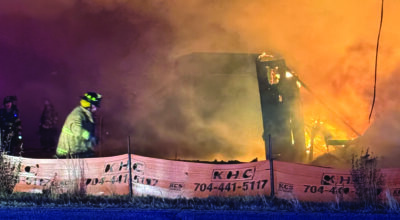Panel at Catawba College works to raise confidence in North Carolina’s election security
Published 12:10 am Saturday, August 31, 2024

- Dr. Michael Bitzer, left, introductes the panel speaking at the North Carolina Network for Fair, Safe and Secure Elections' event on Wednesday. Panelists were, from left, Sharon Main, Kenneth Stutts, David Hood, Bob Edmunds and Dr. Stephen Tate.
SALISBURY — A panel hosted at Catawba College on Wednesday gave North Carolina elections officials and experts an opportunity to provide accurate information about election laws and processes in an effort to increase confidence in the state’s voting system.
The panel included Rowan County Elections Director Sharon Main, Rowan County Board of Elections member Kenneth Stutts, Catawba County Board of Elections member David Hood, former U.S. Attorney and N.C. Supreme Court Justice Bob Edmunds and UNC Greensboro Professor and cybersecurity expert Dr. Stephen Tate. Dr. Michael Bitzer, a professor of politics and history at Catawba College, moderated the event.
The North Carolina Network for Fair, Safe and Secure Elections hosted the event. The organization, headed by former Democratic Mayor of Charlotte Jennifer Roberts and former Republican Supreme Court Justice Bob Orr, made a point of creating a bipartisan panel, with the two board of elections representatives being the Democrat Stutts and the Republican Hood.
“In North Carolina, and I don’t know how it is in other states, there are Democrat, Republican and unaffiliated people involved at every step in the process and not by themselves. That system is designed to encourage confidence that there is not something untoward going on from one direction or the other,” said Hood.
The organization began the tour, which will include panels throughout the state, because of what it views as decreasing confidence in the safety and security of the balloting process, which panel members said was unfounded in North Carolina.
“We have seen candidates from both parties claiming that the elections were rigged and that an election was stolen. It’s frankly hard for me to think of anything more corrosive to our democracy than spreading the idea that our elections are for sale,” said Edmunds.
Tate said that he wanted people to understand that the machines counting ballots are extensively tested at the national, state and local levels and that at the end of the day, there are many checks and balances in place just in case the machines fail. The tabulators, the machines that count the ballots, are not connected to the internet and, therefore, cannot be hacked into. After the ballots are fed into the tabulator, they filter into a lockbox and random precincts are audited during the post-election certification process. Main also shared that the official results are kept both on a paper copy and in a computer that is not connected to the internet in any way.
“The number of checks that go into this, we don’t trust the machines. A lot of my work is trying to make the machines as secure as they can possibly be, but the fact is they’re not perfect, but they don’t need to be because there’s so many other checks in place,” said Tate.
The panelists were asked about the protections that are in place to prevent ineligible people from casting votes. Main said that eligible voters register with their driver’s license and the last four numbers of their Social Security Number, which verifies whether that person is an eligible voter.
“I have heard people argue, well that’s not completely foolproof. We need to ‘check citizenship.’ I would just like to point out as a practical matter that the United States doesn’t have a citizenship roll. There’s no such thing. If you are looking for some Holy Grail out there that you think we should be using other than that process, I challenge you to tell me what it is. There is no such thing,” said Hood.
Hood went on to say that the system Main spoke of is the only possible system and that there has been no evidence of non-citizens voting.
Main and Stutts also emphasized that whenever someone speaks of the voter rolls being purged, that is generally a regular process where recently-deceased people, duplicated voters who re-registered in another location and other voters who are ineligible are removed from the rolls.
“I see it in the news the past couple of days and the big headlines saying millions of people have been purged. I see the headlines, but if you read the article most of those people have unfortunately passed away. That’s the majority of people that come off of our rolls with people that move,” said Stutts.
When asked if recent news reports stating that some Georgia counties may not certify their results may raise worries that some North Carolina counties may do the same, both Stutts and Hood said that they did not believe so. Hood reiterated the bipartisan status of the county board of elections, saying that members could be confident that everything has been “double-checked and triple-checked.”
He also pointed to the randomly selected precincts that get hand counted as well as the various other audits as reasons he has always felt confident in the results.
“We are legally obligated to certify the election. If we don’t certify, that means something’s wrong, and that means we have not done our job. I want to emphasize that. We are legally obligated to certify the election and if something’s wrong, we need to fix it before we sign that big paper book saying these are the results from each precinct and sending it to the state,” said Stutts.
The panel also received questions about matters not concerning election security, such as what roles local election officials filled, what accessibility options are available within the voting process and how citizens can foster healthy debates and conversations around politics in an “increasingly divided climate.”
For the role question, Hood and Stutts said that their main role was both to provide oversight over the election process as well as to advocate for the board of elections staff and make sure they have as many resources as possible. Main said that while her role changes depending on the time of year, currently, much of her time was spent proofing ballots, providing free photo IDs in the office and through outreach to nursing and assisted living facilities and simply answering questions from the community.
For accessibility concerns, Main noted that on Election Day and during early voting, people without transportation can request an absentee ballot and people who cannot enter the polling places can vote by parking in special marked areas and utilizing curbside voting. If someone is unable to access the free photo IDs for any reason, they can file a provisional ballot at the polling location and state that they don’t have an ID and why. That provisional ballot is then looked at by an elections official who will either verify it or deny it. There is also a machine that allows people who are unable to fill in the bubbles on the ballot to vote by utilizing a touch-screen.
As for the question about political conversations, Stutts answered that citizens should be involved in their community, not just in a civic sense but also by simply talking to their neighbors and getting to know them.
“I am dismayed at the lack of individuals that show up to the Salisbury City Council meetings, but then I hear them complain about things that are happening in Salisbury. Get involved, I know there are several open board seats in the city. Get involved in local affairs. Get involved in nonprofits. Start talking to other people in your community. What happens here is what affects your daily life. Not what’s happening in Texas, not what’s happening in Wisconsin, not what’s happening in D.C, it’s what happens here and what decisions are made here,” said Stutts.
Hood urged people to have people inside their circle that they can disagree with and argue with in a healthy way.
“We suffer as a society when we’re in these little silos where everybody that we know thinks one particular way. First of all, that’s not very interesting, and secondly, it’s not very good for the United States of America. We are all Americans,” said Hood.
Edmunds said that from the perspective of a former down-ballot candidate, voters should take more opportunities to meet local candidates.
“There are opportunities to meet candidates and they are eager to meet you. So, if you want to know more about the people who are actually on the ballot and in the arena, take one of those opportunities,” said Edmunds.
Tate reiterated that his main takeaway from the event was how many people are involved in the elections process that simply want to make sure everybody’s vote counts. He said that North Carolina does a great job keeping elections safe and secure.




